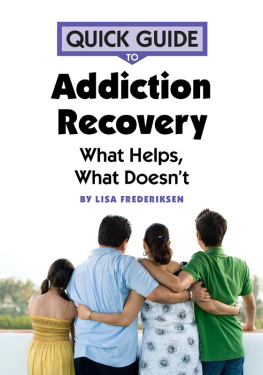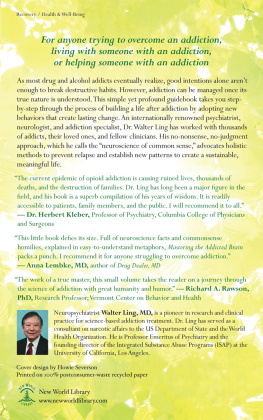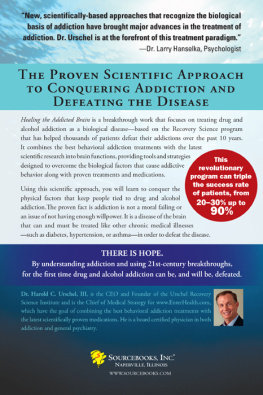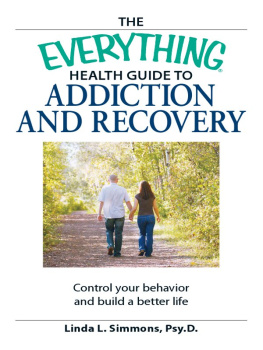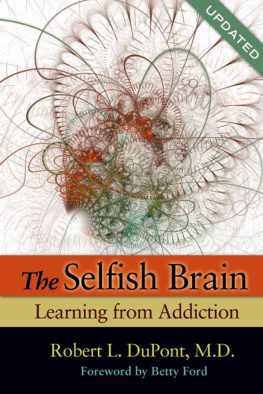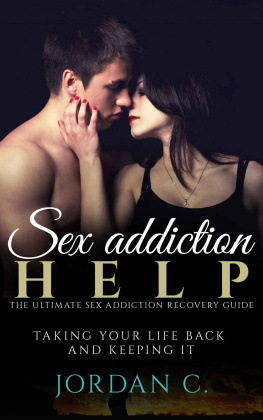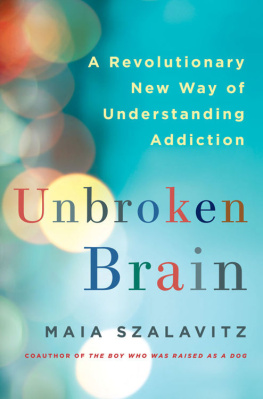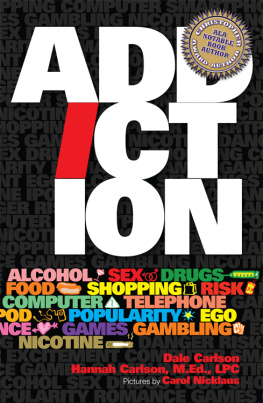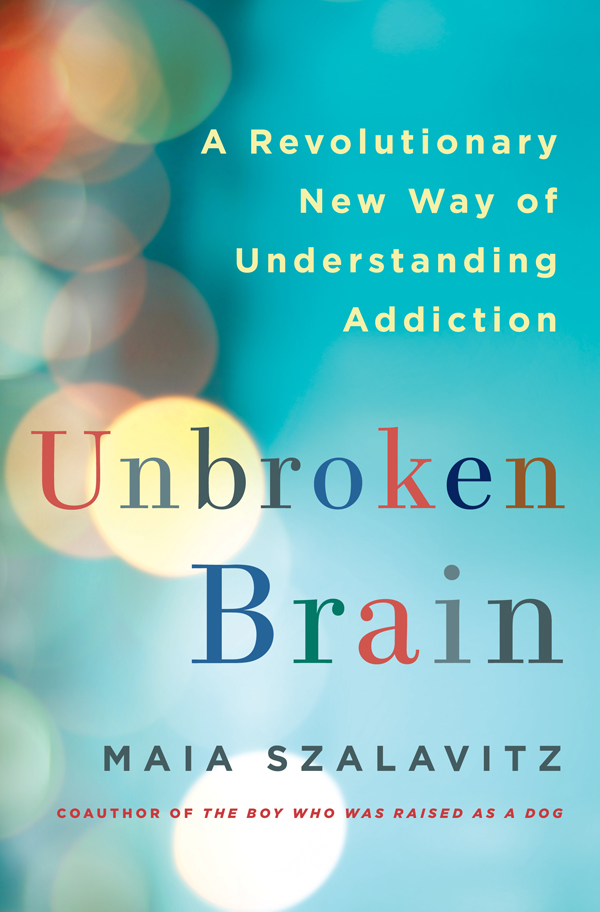Contents
Guide

The author and publisher have provided this e-book to you for your personal use only. You may not make this e-book publicly available in any way. Copyright infringement is against the law. If you believe the copy of this e-book you are reading infringes on the authors copyright, please notify the publisher at: us.macmillanusa.com/piracy.
To Ted
Special acknowledgment to the Soros Justice Fellowship Program, which supported the completion of this book.
Writing about addiction presents many challenges. One of the most difficult is the omnipresence of stigmatizing and inaccurate language. Advocates have successfully advanced person first language to describe people with other types of conditions like schizophrenia and bipolar disorder, observing that characterizing individuals entirely by their illness is dehumanizing. But this advance has yet to reach most media coverage of addiction, which also spews degrading terms like junkie, drunk, and crackhead in ways that are inconceivable in other health reporting.
Consequently, I have tried throughout to use person with addiction or person with alcoholism in place of addict or alcoholic. When I do use the shorthand, it is only because the alternative would have been unduly clunky or repetitive or because I am referring to a stereotype. Further, I have only included the demeaning term abuse to describe drug problems when citing unfortunately named government agencies or the now-obsolete psychiatric diagnosis of substance abuse, which formerly labeled problems milder than addiction. The preferred term for less severe drug problems is substance misuse, which doesnt automatically associate drug users with child abusers, molestation, and domestic violence. (Drug use is the term for substance use that is not associated with harm or addiction.)
Moreover, when writing about autism, I have used the term autistic person rather than person with autism because that is the preferred language of many autistic advocates. These activists see autism as intrinsic to who they are and view saying person with autism as being similar to describing a woman as a person with femaleness. I have also used addicted peoplein this case, to minimize repetition and awkwardness.
Finally, I want to note that in the memoir sections of this book, names have been changed.
There is often a struggle, and sometimes, even more interestingly, a collusion between the powers of pathology and creation.
OLIVER SACKS
I AM LYING ON MY BACK inside the thin metal tube of the brain scanner at the Semel Institute for Neuroscience and Human Behavior at UCLA, trying not to think about coffins and earthquakes. On my thigh is a rubber ball to squeeze in case of panic, which can immediately liberate me from the giant white donut-shaped machine; my head is now centered deep in the hole. Earlier, as I was propelled inside on sliding rails, I couldnt help but be reminded of the drawers in which corpses are kept in morgues. Although Im wearing earplugs, the machines metallic roarcomplete with occasional shaking and shrill beepingseems deafening. Since I am claustrophobic and abhor loud noise, I try to focus on my breathing. One task I will perform here is supposed to measure impulse control, but it is taking nearly all of mine not to immediately crush the squeeze ball and escape.
Im not being scanned because a doctor has ordered it. Ive actually chosen to put myself into this tight spot as part of an experiment. I want to understand more about addiction: my own history of it and what it means more generally. How did I go from being a gifted child and Ivy League scholarship student to injecting cocaine and heroin up to 40 times a day? Why did I recover at 23, when many others take much longer or succumb? More important, what determines who gets hooked, who recovers, and who does not? And how can we as a society do better at addressing addiction? As I wait in the scanner, I recall the last days of my drug use, a distressing period in 1988 when I spent my time either shooting up, selling drugs, or trying to buy. I consider what has changedand what hasnt.
Sadly, had I nodded off in the 80s and somehow been revived in 2015, I wouldnt find much different about how we frame and deal with addiction. Sure, at least four states and Washington, D.C., have legalized recreational marijuana sales. That would be shocking to anyone whose last memories were of the Just Say No years. And yes, addictive behavior is back in the media spotlight, though these days its not crack but Internet addiction, sex addiction, food addiction, gaming addiction, and the tragic drumbeat of prescription overdose deaths (celebrity and otherwise) that get the most attention. Overdoses are now, in fact, the number one cause of accidental death, surpassing even auto fatalities.
Indeed, today, more people than ever before see themselves as addicted or recovering from substance addiction: 1 in 10 American adultsmore than 23 million peoplesaid theyd kicked some type of drug or alcohol addiction in their lifetime, in a large national survey conducted in 2012. At least another 23 million currently suffer from some type of substance use disorder. That doesnt even count the millions who consider themselves addicted to or recovering from behaviors like sex, gambling, or online activitiesnor does it include food-related disorders. With the 2013 declaration by the American Medical Association that obesity, like addiction, is a disease, up to one in three Americans may now qualify due to their body weight.
At the same time, Big Pharma, Big Food, Big Tobacco, Big Alcohol, and Big Business in general all seem to intimately understand addiction and how to manipulate it. However, most of the American publicincluding most people with drug problems and their familiesdo not. Trapped in outdated ideasmany unchanged since the flapper days of Prohibitionwe continue to recycle the same tired debates and enforce counterproductive criminalization strategies. But it doesnt have to be this way.
I propose here a new perspective, one that could help end this stagnation and suggest a way forward in treating, preventing, and otherwise managing addictive behavior. As this book will demonstrate, addiction is not a sin or a choice. But its not a chronic, progressive brain disease like Alzheimers, either. Instead, addiction is a developmental disordera problem involving timing and learning, more similar to autism, attention deficit hyperactivity disorder (ADHD), and dyslexia than it is to mumps or cancer. This is clear both from abundant data and from the lived experience of people with addictions.
Like autism, addiction involves difficulties in connecting with others; like ADHD, it can also be outgrown in a surprisingly large number of cases. Moreover, like other developmental disorders, addiction can be associated with talents and benefitsnot just deficits. For example, people with ADHD often thrive as entrepreneurs or explorers, while autistic people can excel at detail-oriented tasks and many are highly talented musicians, artists, mathematicians, and programmers. Dyslexia can improve visual processing and pattern finding, which is also helpful in science and math careers. Addiction is frequently linked with intense drive and obsessiveness, which can fuel all types of success if channeled appropriatelyand some believe that the outsider perspective of people with illegal drug addictions is linked with creativity. In all of these conditions, the boundaries between normal and problem behavior are fuzzy.


